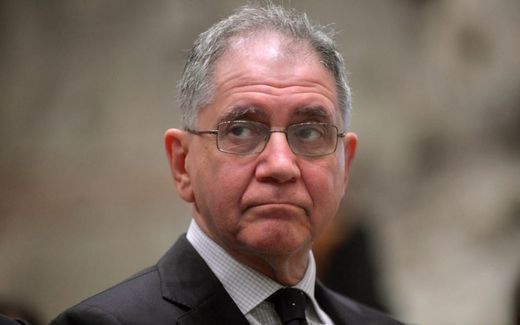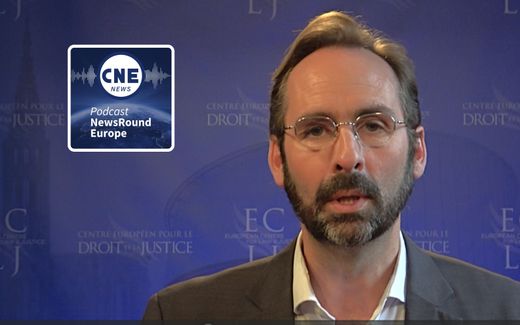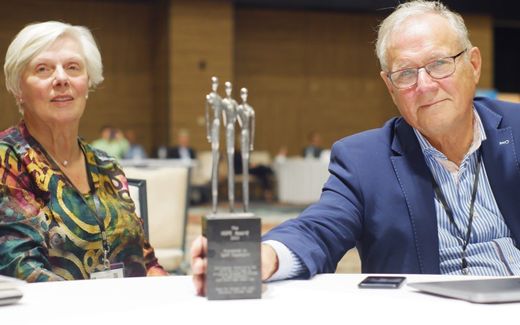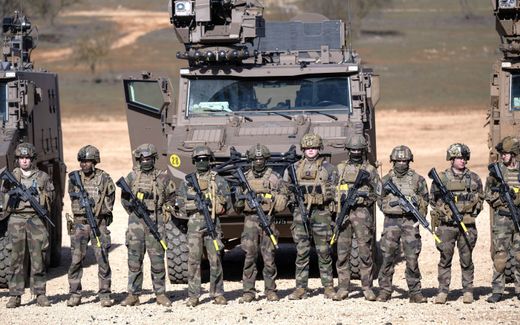How has the EU lost its Christian ideals?
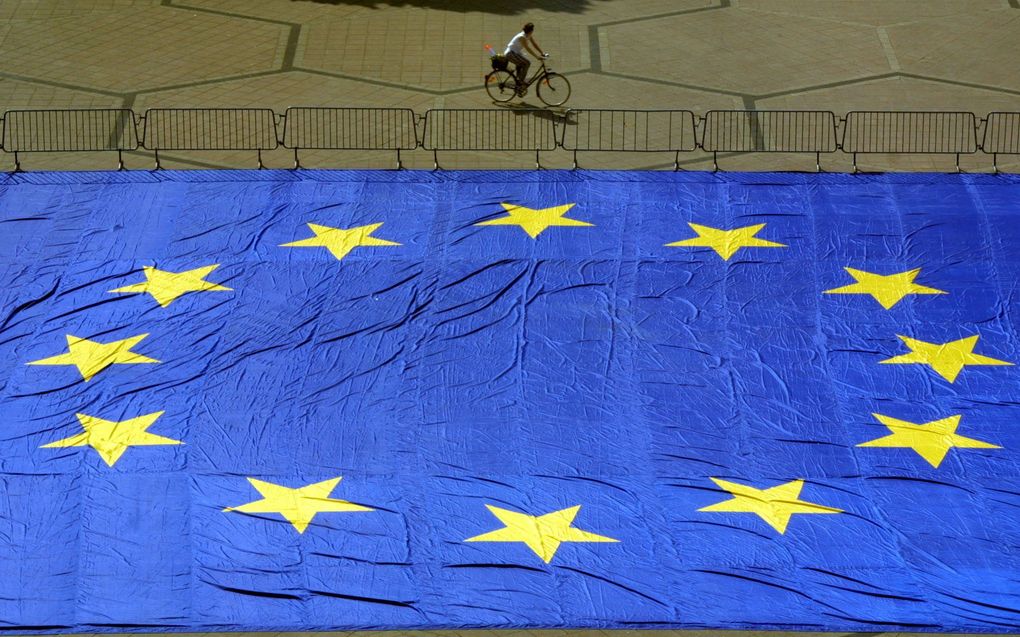
A cyclist passes by a 600 square metre flag draped in front of Robert Schuman University in Strasbourg, France. Photo AFP, Damien Meyer
Christian Life
While many have not heard of Robert Schuman (1886-1963), he became one of the founding fathers of the European Union after drawing up the "Schuman Plan" 75 years ago in France. The plan may have brought peace for decades, but the EU's recent encroachment on free trade and Christian values has made the international organisation unpopular. But how did we get to this point? Cedric Placentino gives us a historical tour into where we are now.
Stay up to date with Christian news in Europe? Sign up for CNE's newsletter.
Who was Robert Schuman?
Despite his French nationality, his daily life was international from his childhood. Robert Schuman was born in Luxembourg and grew up in Lorraine, then a Prussian region across the border of the small Grand Duchy. Moreover, some family members lived in the Belgian province of Luxembourg, and at the end of the First World War, he witnessed firsthand the transfer of Alsace and Lorraine from Germany to France.
But Schuman was above all a devout Roman Catholic Christian, so much so that he long hesitated between pursuing the life of a monk or choosing a career as a lawyer. He ultimately chose the latter, and this led him to become involved in politics. However, Schuman never truly renounced the monastic lifestyle, as evidenced by the fact that he never married.
During World War II, Robert Schuman was arrested by the Gestapo and sent to Neustadt an der Haardt prison (now Neustadt an der Weinstraße, in Rhineland). There, he faced threats from Nazi officials who sought to persuade him to publicly support their cause. Schuman resisted and even managed to escape the free area of France, where he hid in a monastery.
During his imprisonment, Schuman had been able to hear precious details of German military operations. He quickly understood that the Nazis were going to lose the war. This prompted him, during his years in hiding in France, to develop a plan for reconstruction so that war would no longer be possible on European soil.

After the war ended, Schuman was quickly recalled to the political world. As Foreign Minister, he sought to find a way to build peaceful relations with his European neighbors, particularly with Germany. It was during these years that he met Frank Buchman (1878-1961), a German-American Lutheran missionary. Buchman invited high-level officials from all nations to his centre in Caux, Switzerland, to hear his message of repentance and reconciliation. Among his visitors was a certain Konrad Adenauer (1876-1967), who would soon become German Chancellor. Buchman was a key figure in bringing the two men together.
Providence had ensured that not only did Robert Schuman and Konrad Adenauer share the same Roman Catholic faith, but so did the Italian Prime Minister Alcide De Gasperi (1881-1954). All three men were driven by the same motivation to ensure that war would no longer be possible, so that economic recovery could occur in a Europe too often devastated by repeated wars.
The Schuman Plan
So how did Schuman go about making war impossible on a European level? His idea was to place the French and German coal and steel industries, the main suppliers of materials needed to manufacture weapons, under a common transnational authority. Thus, according to Schuman’s logic, Germans and French would no longer be able to wage war on each other. The plan was opened to any other nation wishing to join the project. From its inception, six nations chose to join what was called the European Coal and Steel Community (ECSC). In addition to France and Germany, De Gasperi’s Italy signed the agreement. The other three nations were Belgium, Luxembourg, and the Netherlands, which were already united in an economic agreement known as Benelux since 1944. Since then, the content of the agreements forming what is now known as the European Union has continued to grow, as has the number of the member-states.
Today, 75 years later, what conclusions can we draw from this Schuman Plan? Has it blessed Europe with peace and prosperity?
Clearly, the results have exceeded the founder’s expectations. Schuman wanted to make war impossible, and so it was. Today, an 80-year-old Western European can boast of never having known war. This would have been impossible for all the previous generations since the fall of the Roman Empire.
The second objective pursued by the Schuman Plan was economic prosperity. This would only be possible if war did not reappear in Europe. Once again, the results exceeded expectations in the coming years. The policy pursued by the first generations of European leaders could be summed up as “abundant and cheap energy” to allow industrial development. Abundant energy, combined with the freedom of movement symbolized by the Schengen Agreement (signed in 1985), played a considerable role in the unprecedented economic growth that Western Europe experienced. Eastern European communists had long dreamt that the rest of Europe would join them. But in the end, the economic growth of the West had led the nations of the former Eastern Bloc to knock at the door of the European Union.
We could stop here and say that the Schuman Plan was a total success. But this perception would be far from complete. Today, the European Union is also a source of problems. Brussels has become a machine controlling more and more areas of European society. How did we get here?
Shortcomings
Schuman’s European dream had two main objectives for Europe: peace and prosperity. This dream has become reality. However, the first word that comes to mind for many when the European Union is mentioned is neither “peace” nor “prosperity” but “bureaucracy”. European directives adopted in Brussels are influencing more and more areas of society and causing a reduction of national autonomy. More and more people are embittered by this situation, and this in turn fuels political movements seeking to deconstruct the European Union. But how did we get to this point? Is it possible that the Schuman Plan contained internal flaws?
To answer this question, we must return at the end of World War II. Since Robert Schuman and his Roman Catholic brothers Konrad Adenauer and Alcide De Gasperi sought to make war impossible in Europe, they first needed to identify the causes that had led to the outbreak of war in Europe. But what were they?
For Schuman, border disputes were the main causes of the problems. Surely, several wars had arisen from the dispute over the Franco-German border. But the real root of the problem still laid elsewhere. Despite the ideologies that divided Nazi Germany, communist Soviet Union, and democratic Western Europe, all shared the same conviction regarding the role of the state. The state must be the single institution that governs all spheres of a nation’s society. What divided these nations was simply how the state should govern all these spheres, but not the idea that the state should govern all of society. For example, the Nazis believed that the state should govern everything according to the ideology of national socialism, while the communists believed that the state should govern everything according to international socialism.
The idea of the state governing all of society was perhaps best expressed by the German philosopher Georg Wilhelm Friedrich Hegel (1770-1831). He stated that “The state is the march of God on earth.” In other words, since the nineteenth century, the prevailing idea in Europe was that the state was sovereign over everything. Progressively, it even acquired the right to change God’s standards for society. Death, marriage, etc. Could also be redefined by the state.
Robert Schuman wanted the best for Europe. As a devout Christian, he sought peace between the European nations. But his Roman Catholic worldview could not address the Hegelian view of the state. This is because Roman Catholicism was just as hierarchical as Hegel’s pagan worldview. And so, instead of eradicating the false state-god, the Schuman Plan sought to create a superstructure in order to limit the activities of each national false god.
Even the Roman Catholic idea of subsidiarity, that is, the decentralization of decision-making, did not challenge the presuppositions of the state-god. In other words, the Schuman Plan was a band-aid covering a tumour. Certainly, it helped in slowing down (for a time) the imperialist tendencies of some European nations over the last half a century. Today, however, the European Union still operates according to Hegel’s logic, which gives political institutions the right to legislate in all areas of society. That’s why, for example, decision-makers, national or European, believe they can legislate on abortion or euthanasia, over and against what God has decreed.
The future
While Roman Catholics were present to imagine a peaceful future in Europe, Protestants were notably absent at the end of World War II. Yet, Reformed philosophers such as Abraham Kuyper and Herman Dooyeweerd had given them the tools to offer an equally sustainable alternative, and even to destroy the true cause of Europe’s misery, Hegel’s false state-god.
According to the biblical worldview, the state is not the supreme institution governing all spheres of society. The supreme ruler of all the nations is Jesus Christ (Matthew 28:18). Under his authority, three institutions are directly accountable to him: the state, but also the family and the church. Each institution has its own spheres of responsibility. This idea leads to radically different consequences for the nations. For example, today, all European nations consider it normal for the state to provide for healthcare, welfare or education. But these have become a consequence of Hegel’s vision. According to the Bible, these areas are primarily under the responsibility of the family. And if the latter cannot meet the challenge, the Church, or other voluntary associations, must fill the void.
If the European nations want to ensure a future of peace and prosperity, they must first recognise the authority of Jesus Christ. They must therefore recognise that the state cannot govern all spheres of society. They must acknowledge the autonomy of the family and of the Church in their respective spheres. This biblical vision was already more or less applied in Protestant nations such as the ancient Dutch Republic, Switzerland, or the newly founded United States. If the European nations reorganise themselves in this way, a future European community of nations without totalitarian tendencies will be possible.
Since the solid biblical worldview was notably absent at the end of World War II, we can thank God that He raised a Roman Catholic like Robert Schuman for proposing a plan that has allowed Europe to experience an unprecedented period of peace. However, his Roman Catholic and Aristotelian worldview and his personal friend's influence, French philosopher Jacques Maritain, failed to eradicate the true cause of Europe's repeated wars until the mid-twentieth century. Let us pray, therefore, that a new generation of Christians will arise to build tomorrow’s Europe on firmer Biblical foundations.
Related Articles




